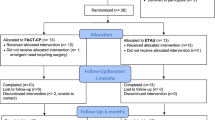Abstract
In patients with HIV/AIDS, chronic pain is common and analgesics pose serious risks. Cognitive-behavioral therapies (CBT) provide an alternative. This study evaluated feasibility and impact of a CBT-based pain management program in three public primary care clinics for HIV patients. The program included a workbook and 12-weeks of group CBT sessions. HIV-positive patients with chronic moderate to severe pain were invited to participate in the program and were assessed at enrollment, 6, 12, and 24 weeks. Despite only moderate group attendance, program enrollment was associated with significant improvements in pain intensity, pain-related functioning, anxiety and acceptance, and mental health. At 24 weeks, effect sizes for pain outcomes were −0.83 for pain intensity and −0.43 for functioning. The pattern of change in outcomes was consistent with predictions based on cognitive-behavioral theory. Effects were observed at all clinics. Adding CBT-based pain management into primary care may provide important benefits for patients with HIV/AIDS.
Similar content being viewed by others
References
Rosenfeld B, Breitbart W, McDonald MV, et al. Pain in ambulatory AIDS patients. II: Impact of pain on psychological functioning and quality of life. Pain. 1996; 68(2–3):323–8.
Vogl D, Rosenfeld B, Breitbart W, et al. Symptom prevalence, characteristics, and distress in AIDS outpatients. Journal of Pain and Symptom Management. 1999; 18(4):253–62.
Norval D. Symptoms and sites of pain experienced by AIDS patients. South African Medical Journl. 2004; 94(6):450–4.
Breitbart W, McDonald MV, Rosenfeld B, et al. Pain in ambulatory AIDS patients. I: Pain characteristics and medical correlates. Pain. 1996; 68(2–3):315–21.
Larue F, Fontaine A, Colleau SM. Underestimation and undertreatment of pain in HIV disease: multicentre study. British Medical Journal. 1997;314(7073):23–8.
Dobalian A, Tsao JCI, Duncan R. Pain and the use of outpatient services among persons with HIV: results from a nationally representative survey. Medical Care. 2004; 42(2):129–38.
Nicholson B. Responsible prescribing of opioids for the management of chronic pain. Drugs. 2003; 63(1):17–32.
Ballantyne J, Shin N. Efficacy of opioids for chronic pain: A review of the evidence. Clinical Journal of Pain. 2008; 24(6):469–478.
Payne R. Limitations of NSAIDs for pain management: toxicity or lack of efficacy? Journal of Pain. 2000; 1(3 Suppl):14–8.
Savage S. Opioid therapy of chronic pain: Assessment of consequences. Acta Anaesthesiologica Scandinavica. 1999; 43(9):909–17.
Ho WZ, Guo CJ, Yuan CS, et al. Methylnaltrexone antagonizes opioid-mediated enhancement of HIV infection of human blood mononuclear phagocytes. Journal of Pharmacology and Experimental Therapeutics. 2003; 307(3):1158–62.
Noel RJ, Rivera-Amill V, Buch S, et al. Opiates, immune system, acquired immunodeficiency syndrome, and nonhuman primate model. Journal of Neurovirology. 2008; 14(4):279–85.
Vallejo R, de Leon-Casasola O, Benyamin R. Opioid Therapy and Immunosuppression: A Review. American Journal of Therapeutics. 2004; 11(5):354–65.
Basu S, Bruce RD, Barry DT, et al. Pharmacological pain control for human immunodeficiency virus-infected adults with a history of drug dependence. Journal of Substance Abuse Treatment. 2007;32(4): 399–409.
Dworkin SF. Somatization, distress and chronic pain. Quality of Life Research. 1994; 3 Suppl 1:S77-83.
Evans S, Weinberg BA, Spielman L, et al. Assessing negative thoughts in response to pain among people with HIV. Pain. 2003;105(1–2):239–45.
Goossens ME, Rutten-Van Molken MP, et al. Health economic assessment of behavioural rehabilitation in chronic low back pain: a randomised clinical trial. Health Economics. 1998;7(1):39–51.
Hildebrandt J, Pfingsten M, Saur P, et al. Prediction of success from a multidisciplinary treatment program for chronic low back pain. Spine. 1997;22(9):990–1001.
Lorig KR, Mazonson PD, Holman HR. Evidence suggesting that health education for self-management in patients with chronic arthritis has sustained health benefits while reducing health care costs. Arthritis and Rheumatism. 1993;36(4):439–46.
Mayou RA, Bryant BM, Sanders D, et al. A controlled trial of cognitive behavioural therapy for non-cardiac chest pain. Psychological Medicine. 1997;27(5):1021–31.
Turk DC, Okifuji A. Psychological approaches in pain management: what works? Current Opinion in Anaesthesiology. 1998;11(5):547–52.
Hine C, Howell H, Yonkers K. Integration of medical and psychological treatment. Social Work in Health Care. 2008; 47(2): 122–34.
Chiles JA, Lambert MJ, Hatch AL. The impact of psychological interventions on medical cost offset: A meta-analytic review. Clinical Psychology: Science and Practice. 1999; 6(2): 204–220.
Trochim WMK. Pattern matching, validity, and conceptualization in program evaluation. Evaluation Review. 1985; 9(5): 575–604.
Turk DC, Kerns R. Conceptual issues in the assessment of clinical pain. International Journal of Psychiatry in Medicine. 1983;13(1):57–68.
Turk DC, Gatchel RJ, editors. Psychological approaches to pain management: A practitioner's handbook. New York: Guilford Press; 2002.
Clark ME, Gironda RJ, Young RW. Development and validation of the Pain Outcomes Questionnaire-VA. Journal of Rehabilitation Research and Development. 2003; 40:381–95.
Derogatis LR, Melisaratos N. The brief symptom inventory: An introductory report. Psychological Medicine. 1983;13(3):595–605.
McLellan AT, Kushner H, Metzger D, et al. The fifth edition of the addiction severity index. Journal of Substance Abuse Treatment. 1992;9(3):199–213.
Viane I, Crombez G, Eccleston C, et al. Acceptance of pain is an independent predictor of mental well-being in patients with chronic pain: empirical evidence and reappraisal. Pain. 2003;106(1–2):65–72.
McCracken L, Dhingra L. A short version of the Pain Anxiety Symptoms Scale (PASS-20): Preliminary development and validity. Pain Research and Management. 2002; 7(1): 45–50.
Eccleston C, Williams AC, Morley S. Psychological therapies for the management of chronic pain (excluding headache) in adults. Cochrane Database Syst Rev. 2009;(2):CD007407.
Volz A. Social Research Methods. 1996. http://www.socialresearchmethods.net/tutorial/Volz/page2.htm. Accessed Dec 20, 2008.
Trochim WM. Outcome pattern matching and program theory. Evaluations and Program Planning. New York: Pergamon Press; 1989.
Cucciare M, Sorrell J, Trafton J. Predicting response to cognitive-behavioral therapy in a sample of HIV-positive patients with chronic pain. Journal of Behavioral Medicine. 2009; 32(4):340–8.
Ellis RJ, Toperoff W, Vaida F, et al. Smoked Medicinal Cannabis for Neuropathic Pain in HIV: A Randomized, Crossover Clinical Trial. Neuropsychopharmacology. 2009;34(3):672–80.
Furlan A, Sandoval J, Mailis-Gagnon A, et al. Opioids for chronic noncancer pain: a meta-analysis of effectiveness and side effects. Canadian Medical Association Journal. 2006;174(11):1589–94.
Buenaver M, Haythornthwaite JA. Cognitive-Behavioral self-help for chronic pain. Journal of Clinical Psychology. 2006;62(11):1389–96.
Acknowledgements
We would like to thank Drs. Michael Clark, Lance McCracken, and Kevin Vowles for their assistance in predicting the clinical effects of the cognitive-behavioral therapy program provided in this study. The work described in this manuscript was supported by a Community Collaborative project grant (CR04-PAIRE-519) and a Community Collaborative HIV Research Center award (CH05-SMCHC-612) from the California HIV/AIDS Research Program and by the Health Services Research and Development Service, Department of Veterans Affairs. The opinions expressed are those of the authors and do not reflect the official positions of the Department of Veterans Affairs nor the California HIV/AIDS Research Program. The treatment manual, CD with relaxation exercises, and additional description of the program implementation are available upon request from the authors.
Author information
Authors and Affiliations
Corresponding author
Rights and permissions
About this article
Cite this article
Trafton, J.A., Sorrell, J.T., Holodniy, M. et al. Outcomes Associated with a Cognitive-Behavioral Chronic Pain Management Program Implemented in Three Public HIV Primary Care Clinics. J Behav Health Serv Res 39, 158–173 (2012). https://doi.org/10.1007/s11414-011-9254-y
Published:
Issue Date:
DOI: https://doi.org/10.1007/s11414-011-9254-y




